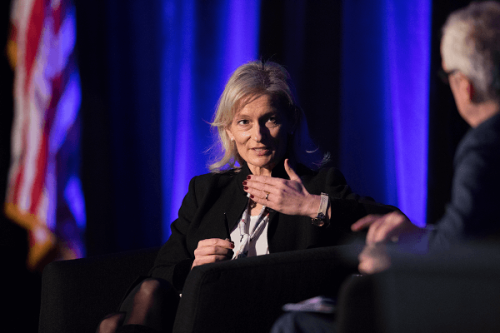At Callan’s recent National Conference, speakers tackled the major issues and themes facing institutional investors in the coming years. We’ll cover the highlights of their comments in a series of posts like this one on our blog.
In her talk “What’s Next? Making Sense of a Global Economy,” Zanny Minton Beddoes, the editor-in-chief of The Economist, highlighted the “extraordinary dichotomy” between the political realm, full of grim news, and the global economy and financial markets, which are remarkably strong. The focus for investors, she said, should be to take a stance on which of those two views is right: Should they believe in the strength of the economy or take a signal from the bad political news?
To explain the divergence, she identified three factors: policies designed to combat financial problems worked; “bad things” did not happen; and the healing power of time since the Global Financial Crisis (GFC).
To illustrate policies that worked, she cited the case of China. To combat an economic slowdown, policymakers took effective steps to address overcapacity and other issues. That led, she said, to a turnaround in global commodity prices and to growth in emerging markets, which marked the beginning of a broad acceleration in the world economy.
Among the bad things that did not happen, she said, was that inflation has not taken off, and at the time of her speech in late January, the “bark” of Trump’s protectionist policies had been worse than their bite.
We are, she said, in a sort of “Goldilocks” world—but how long will it last? In the short term, it is hard to see what would slow it down. But she does see three potential short-term risks: inflation, a trade war, and geopolitical upheaval.
She argued that inflation could still stay low. The main reason: caution by new Fed Chair Jerome Powell (he “is not going to stick his neck out,” she said).
But she did say trade conflict was more of a risk, in fact the single biggest policy risk, saying that Trump is still a protectionist (“dark Donald” buys into some parts of the Steve Bannon agenda, as she put it). Action is more likely against China, she said, in part because there is some merit to the idea that the Chinese are not fair traders. But unlike Japan in the 1980s, China will almost certainly retaliate, and that creates the real risk of tit-for-tat escalation.
While geopolitical risk is hard for investors to price, it is nonetheless very important, she noted. She continued that it is much higher than many people realize, especially regarding North Korea.

Over the long term, she is more concerned. The geopolitical risks get worse the longer one looks out, and the economic outlook looks grim as well, in part because the current policy mix does not help the voters who supported Trump, Brexit, and populist parties, and their anger has not gone away.
On geopolitics, there is a tremendous shift as the United States moves away from a global leadership role while China steps up to take one. This shift started before Trump, but accelerated dramatically in the last 12 months. This is mirrored in the economic realm: China has either caught up with the United States in technology or is even ahead. This shift will cause China to butt up against the United States, especially since U.S. society has not come to grips with Trump’s ceding this country’s preeminent role.
Her second medium-term concern is that the forces driving the discontent of the white working class—stagnant living standards and rapid cultural change—have not gone away. The current times are akin to the late 19th/early 20th century, which also saw rapid technological change, wide inequality, major geopolitical shifts, and increased immigration and related political pushback.
But so far the difference now is that there has been little shift in politics and policy; no equivalent of the progressive agenda in the 20th century. She said she would be stunned if that doesn’t change, with a similarly dramatic shift in the relationship between the state and private sector, but it is uncertain how, and the big question is who will be the modern equivalent of the Progressives from the early 20th century. It is not clear who that will be in the U.S., but Emmanuel Macron may be a European version.


